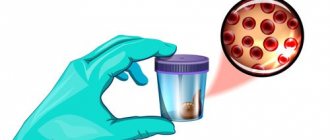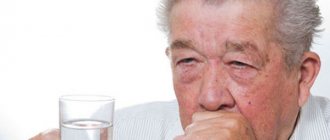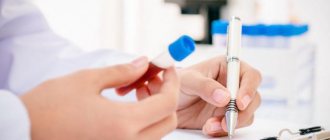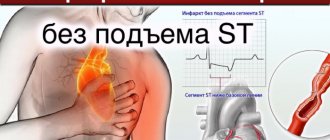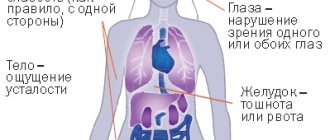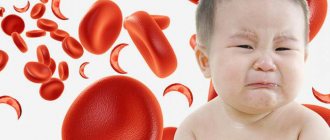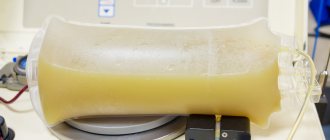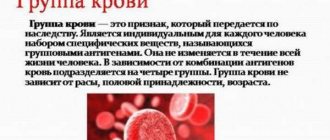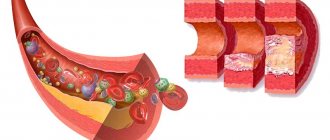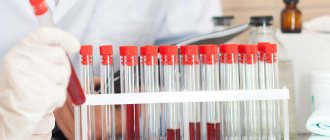When blood viscosity increases, the body's condition may worsen. Blood is a transporter of oxygen and nutrients to all tissues and organs, and when its movement is slow, oxygen starvation develops and metabolic processes fail, which causes a number of diseases.
To prevent this, it is important to know what foods to use to thin viscous blood. But here, too, the main thing is not to overdo it, because plasma that is too liquid is also undesirable, since in this case even minor damage can lead to huge blood losses. You also need to know that there are products that thicken liquid blood.
Thrombophilia
However, there is also the other side of the coin - the pathology of thrombophilia, which manifests itself in the case of disturbances in the blood clotting system, which increases the risk of thrombosis, varicose veins, heart attack, stroke, diseases of the gastrointestinal tract (kidneys, stomach, intestines).
In a healthy state, blood should move freely through the vessels, supplying tissues with oxygen. Blood with increased viscosity forms clots and thrombi, both inside large vessels and in small capillaries. Under such circumstances, tissues do not receive enough oxygen and begin to suffer from hypoxia. As a result, a person loses his ability to work and his condition worsens greatly. To eliminate symptoms, urgent measures are needed to reduce blood clotting.
Causes of increased clotting
The main factors provoking an increase in the coagulation function may be:
- Changes in hormonal levels (for example, pregnancy) or hormonal diseases.
- Infections.
- Pathologies of internal organs.
- Lack of physical activity, causing slow blood flow.
- Genetic abnormalities.
- Radiation dose received.
- Autoimmune disease.
- The metabolic process is disrupted.
The above processes change the viscosity and amount of chemical elements of the plasma, and accordingly the natural state of such main blood components as red blood cells and platelets is disrupted. In this condition, blood cells stick together, the ratio of fluid and cellular mass is disrupted, and the risk of possible blood clots in vital organs increases. It turns out that if blood clotting is not reduced in time, this can even lead to death.
Symptoms of high clotting
An accurate diagnosis can only be made by a doctor based on blood tests, but some symptoms can be noticed without special equipment; they will be obvious to the average person:
- A large number of bruises that appear as a result of minor injuries and minor bruises. This is due to the increased fragility of small vessels.
- The gums begin to bleed.
- The functioning of the gastrointestinal tract organs (for example, intestines, spleen) is disrupted. This happens due to a lack of oxygen and other useful substances.
- Hemorrhoids increase in size and become overly sensitive and painful.
- Venous nodules and asterisks from blood vessels appear on the legs.
Coagulogram data and their norms
An ideal coagulogram should look something like this:
- Thrombin time is 10-17 seconds.
- Prothrombin time - 78-142%:
- Activated partial thromboplastin time (aPTT) - 25-37 seconds.
- Fibrogen - for adults 2-4 g/l, for newborns 1.25-3 g/l.
- Antithrombion III - 83-128%.
- D-dimer - no more than 243 ng/ml, for pregnant women in the last trimester up to 644 ng/ml.
- Plasminogen activity is 80-132%.
- Protein C activity is 70-140%.
- Free protein S - in the male half of the population 74-146%, in the female half of the population 54-123%.
- Lupus anticoagulant - negative.
Treatment with medications
The attending physician prescribes individual drug treatment depending on the test results obtained and the causes of the problem.
Standard drugs that reduce blood clotting are anticoagulants. They are prescribed based on the characteristics of the pathology. It can be:
- Fibrinolytics.
- Antispasmodics.
- Anti-inflammatory drugs.
To restore normal blood volume, transfusion and infusion procedures are used. Blood clots are removed surgically.
If thrombophilia is genetically transmitted, then in order to reduce blood clotting, a long course of aspirin in small doses is prescribed. However, if you are pregnant, taking aspirin is strictly prohibited!
Drugs that reduce blood clotting should be taken strictly as prescribed by the doctor, and the treatment regimen itself should be regularly adjusted depending on new laboratory data obtained from subsequent tests. After all, taking medications to thin the blood can cause uncontrolled internal hemorrhage.
The benefits of alcohol in thinning the blood
Drinking alcohol in moderation is a balancing act. If you can drink within a strict limit to maintain moderation, this may be better for some health conditions than not drinking at all. But consuming slightly less than the recommended moderate dose is much more dangerous than not drinking at all. This effect is called the J-curve. Therefore, it is believed that moderate drinking is a double-edged sword with some positive and negative effects.
Precautions against drinking alcohol while taking blood thinners
It is extremely important to abstain from alcoholic beverages while taking anticoagulant medications (that is, pharmacological blood thinners) such as Coumadin (warfarin). This warning is due to the blood-depleting effects of alcohol, which may interact with prescribed medications. If you drink alcohol regularly, it will be more difficult for your doctor to determine the right dosage of the drug. Therefore, often when there is a significant health threat, such as deep vein thrombosis, it is better not to take risks and not drink alcoholic beverages.
It is important to review other medications you need to take. Sometimes they also interact with blood thinners and alcohol. In such cases, you need to take precautions and abstain from drinking alcohol if recommended.
Effect of alcohol on coagulation
Some studies have shown that moderate drinkers tend to have lower rates of heart disease but higher rates of bleeding than people who don't drink alcohol at all.
“The contrasting effects of alcohol are similar to the effects of blood thinners such as aspirin, which apparently prevent heart attacks, but at the expense of increasing the risk of bleeding,” notes Kenneth J. Mukamal, a researcher with numerous articles on the effects of alcohol on coagulation and the development of cardiovascular disease. .
There's no reason to start drinking
According to the CDC, there is growing skepticism among researchers that moderate alcohol consumption has health protective benefits against heart disease. The bottom line is that while moderate drinking may have some benefits for overall well-being, there are still risks. The benefits of drinking alcohol to thin the blood are quite limited and somewhat questionable, while the likelihood of developing other health problems is quite high.
General recommendations available
In addition to pharmaceutical drugs, there are many readily available methods and means that reduce blood clotting. For example:
- Drink more water: at least 1.5-2 liters per day.
- Replacing black tea with cranberry and grape juice, these drinks reduce platelet activity by 75%.
- Every day you need to eat vegetables, mainly tomatoes and cucumbers.
- Your daily diet should include iodine-rich seaweed and sea fish.
- Of the fruits, grapefruit is the most useful; it is an excellent natural remedy for reducing blood clotting.
- The use of infusions (burdock, cherry, black cherry, St. John's wort) is effective.
- Other foods that reduce blood clotting: dry red wine (no more than 1 glass per day), unrefined olive and flaxseed oils, nuts, sprouted wheat grains, bell peppers, onions, garlic and raspberry jam (a couple of spoons daily for six months).
Other folk remedies
It’s easy to create a herbal collection yourself. It will require hawthorn, meadowsweet, clover, lemon balm, fireweed and valerian. Chop the dried herbs and fruits, mix and pour 2 tablespoons of this mixture into 300 g of clean liquid. To infuse, it is advisable to wrap it or place it in a warm place. Single dose - 50 ml three times a day. Tea made from sage, lemon balm, fireweed, meadowsweet and meadowsweet, taken in equal parts, is beneficial.
Clover, chestnut, lemon, kvass, green tea are products that thin the blood but lower blood pressure. People with low blood pressure should take them with caution.
For a decoction of lungwort or lungwort, you need a tablespoon of dry herb, which is poured with a glass of boiling water and allowed to brew for 2-3 hours. Drink 100 ml three times a day after main meals for 3 weeks. Decoctions are also made using other herbs: thyme, licorice, hazel, linden. To thin the blood, it is recommended to add herbs to teas.
Recommended infusions
How to reduce blood clotting using folk remedies? Traditional medicine recommends the following recipes for preparing tinctures:
- From chestnut. 50 g of chestnut (horse) peel is poured into 0.5 liters of vodka and allowed to brew for 14-15 days in a dark place. Take 30 drops per day 30 minutes before meals, diluting with water. The course of treatment is 3 weeks, and then you need to take a break. There are contraindications: low blood pressure, gastritis, menstrual irregularities, problems with constipation. Before use, you should definitely consult with your doctor, because during the treatment there is a risk of internal bleeding.
- From mulberry. Mulberry roots are filled with water and brought to a boil. The course of treatment is 5 days.
- From Galega officinalis. The infusion is sold at the pharmacy, ready for use. You need to take 30 drops 3 times a day, the course of treatment is 1 month, once a year.
- From gingo biloba. Ginko biloba leaves are infused with alcohol. Drink 0.5 tablespoon 3 times a day 30 minutes before meals. The course of treatment is 1 month, and then a break for 7 days.
- From ginger. Ginger root is grated, poured with boiling water, green tea and cinnamon are added to taste. If desired, you can add lemon or honey. You need to drink 0.5 liters of this tincture tea per day.
The methods listed above are very helpful in reducing blood clotting.
Source: FB.ru
Prescribing any traditional medicine by persons ignorant of medicine without medical examination is unacceptable. You cannot use traditional medicine recipes without consulting a doctor, during the acute period of illness and without finding out the exact diagnosis of the patient!!!
Blood thinning (this is popular terminology) means a decrease in blood clotting and viscosity. Blood viscosity can be reduced only after consultation with a doctor and under the supervision of a blood test for prothrombin, so that there is no sudden thinning of the blood and bleeding and internal hemorrhages. !!!
Thicken the blood: Herbs and products: chokeberry, yarrow, valerian, motherwort, Sophora japonica, burdock, St. John's wort, horsetail, burnet, tansy, corn silk, shepherd's purse, oak bark, viburnum bark, agrimony, rose hips, sparkling cuff, needles of all conifers trees and other herbs.
Food products: buckwheat, nettles, bananas, greens (dill, parsley, coriander, spinach), white cabbage, rowan (red) and chokeberry fruits, cranberries, walnuts.
Thin the blood: dark chocolate (cocoa content more than 70%), garlic, lemon, beets, cocoa, coffee, sunflower seeds, aloe or Kalanchoe juice, apple cider vinegar, garlic and onions, tomato juice, sweet clover herb, ginkgo biloba. Cherry also has a very beneficial effect on blood viscosity. Magnesium, which is abundant in oatmeal, prevents blood from thickening. It is also useful to take 1-2 tbsp daily. tablespoons unrefined vegetable oil, 1 tbsp. a spoonful of honey. Dry red wine is an excellent blood thinner. You can drink a glass of wine a day with food if you do not have gastritis, ulcers, liver disease or other contraindications.
- Chestnut tincture to thin the blood for angina and varicose veins. Pour 50g of horse chestnut peel into 0.5 liters of vodka and leave for 2 weeks. Drink 30-40 drops with 1/4 cup sweetened water 30 minutes before meals 3 times a day. The course of treatment is 3 weeks. Then break for 7 days and repeat the course of treatment. Initially, the dosage can be reduced by drinking 25 drops 2 times a day in the morning and evening for 30 minutes. before meals. And after a week you can increase to the initially indicated dosage. You can carry out treatment this way every month or two for preventive purposes or based on blood test results. Chestnut is contraindicated: for constipation, gastritis, irregularities and delays of the menstrual cycle, poor blood clotting, thrombocytopenia. Do not take orally if you have hypotension. In case of overdose, it can cause convulsions - cramping of the fingers.
- Infusion for thinning the blood. Mix equal parts dry dandelion grass and thorn flowers. Leave 2 tablespoons of the mixture in 2 cups of boiling water for 4 hours, drink ½ cup 4 times a day. Drink the infusion 2 times a year for 2 weeks. During treatment, you should not eat meat or eggs.
- Sweet clover will reduce blood clotting. 1 tsp pour 1 tbsp of boiling water over sweet clover. Drink 1/3-1/2 tbsp. 2-3 times a day. This infusion has an antispasmodic effect and reduces blood viscosity. Can be drunk for 1 month.
- Dioscorea Caucasica for cleaning blood vessels and thinning the blood. 60gr. Dioscorea caucasica roots pour 0.5 liters. vodka. Infuse in a dark place for 14 days, strain, and store in the refrigerator. Take 25 drops with a few sips of water. 3 times a day 20 minutes after meals. Take for 3 weeks. Take a break for 7 days. Then repeat the course. Then again a 7-day break. In total, conduct 3-4 courses
- Mulberry (mulberry) for blood thinning. Mulberry roots. Take 200 g of fresh roots, chop and rinse. Place the washed roots in a saucepan, add 3 liters of cold water and leave for 1 hour. Cook over low heat in a saucepan and cook for another 15 minutes after boiling. Then cool, strain and refrigerate. Drink 200 ml 3 times a day before meals. The course is 5 days, and the break is 2-3 days. Make 2-3 courses in total.
- Ginkgo biloba will thin the blood. Ginkgo biloba reduces blood viscosity, dissolves blood clots and prevents their formation. With the help of this tree, varicose veins, thrombophlebitis, impotence, vegetative-vascular dystonia, cerebrovascular accident, atherosclerosis, headaches and more are treated. Tincture: 50 grams of dry leaves pour 0.5 liters of vodka. Leave for 2 weeks, take 1 tsp. 3 times a day 30 minutes before meals. Course 1 month, 7 days break, then repeat. Take 3 courses, break for 6 months, then repeat.
- Cinnamon and ginger thin the blood. Take fresh ginger root (about 4 cm), a pinch of cinnamon, 1 tsp. green tea. Pour 0.5 liters of boiling water, let it brew, strain, add ½ lemon and honey to taste. Drink during the day.
- Sprouted wheat thins the blood. It is very useful to eat at least 1 tbsp daily. sprouted wheat, you can add it to vegetable salads by mixing with 1 tsp. linseed oil. Wheat grains should be thoroughly washed several times 24 hours before consumption. It can be stored in the refrigerator in a container, but no more than 2-3 days. It should be covered with a napkin and sufficiently moistened. You can eat this salad regularly. When treating with sprouted grain sprouts, it is necessary to reduce the consumption of bread and flour products.
- Raspberries will reduce blood viscosity. 7 tsp raspberry jam a day will strengthen the coronary arteries 2.5 times in just six months. There are even more vitamins and nutrients in raspberries, pre-chopped and mixed with 1+1 sugar, which can be prepared in the summer and stored in the refrigerator all winter. The high content of vitamin C strengthens the walls of blood vessels, and the content of salicylic acid normalizes blood clotting. The effect of raspberries is similar to aspirin, but is safe for the stomach.
- Collection of herbs that thin the blood. Take dry herbs in equal weight proportions: mountain arnica, sweet clover, meadowsweet (meadowsweet) and wormwood. 1 tbsp. pour 1 tbsp. boiling water and keep in a thermos overnight. In the morning, strain and drink 1/3 tbsp 20 minutes before meals. The course is a month. You can grind the same mixture in a coffee grinder and take 1 tsp. 3 times a day for 30 minutes. before meals, with a small amount of water.
Source: www.medglav.com
What foods thicken the blood
Vitamin K is called the coagulation vitamin. Translated from Latin, this word means coagulation or thickening. When, under the influence of adhesive forces, small dispersed particles stick together, forming larger ones.
- Vitamin K is found in all green vegetables. There is a lot of it in lettuce, onions (feather), basil, parsley, celery, all types of cabbage (Peking, white cabbage, broccoli, cauliflower), green tomatoes, spinach...
Among fruits, it is found in apricot, avocado, pineapple, grapes, mango, nectarine, peach, papaya, feijoa, persimmon, prunes, mango, bananas...
- In berries (blueberries, blackberries, cherries, strawberries, cranberries, raspberries, red currants).
- From meat products: in beef and chicken liver, pork, goose, chicken.
- In dairy products (cheeses, whole milk, cream, butter).
Tannins (hallotannic acid) belong to a group of tannins that increase clotting. Therefore, plants containing them are used in traditional medicine to heal wounds and stop bleeding.
Foods with tannins. High concentrations are observed in:
- pomegranates, persimmons, bird cherry,
- sea buckthorn, blueberry, quince,
- black currant, chokeberry,
- blueberries, viburnum, lingonberries,
- cranberries, peanuts, pistachios,
- almonds, walnuts,
- rose hips, chicory, grapes,
- cocoa, rhubarb, cinnamon,
- cloves, thymes, cumin,
- bay leaf, legumes,
- eucalyptus leaves, oak bark,
- chestnut, acacia, dark chocolate.
Tannins give products astringency and astringent properties. The concentration of tannins in different plants varies.
Flavonoids. A group of substances found in greens, berries, fruits, and vegetables that can change the activity of enzymes synthesized by the human body. Over 6 thousand flavonoids are known in nature, which are divided into 24 groups. They, having a lot of useful properties, being strong antioxidants, at the same time, contribute to blood thickening (slightly).
More well-known are pigments that color vegetables and fruits in different colors and vitamin P (rutin). Flavonoids enter the body with foods:
- blackberries, blueberries,
- grapes, green tea,
- citrus fruits, leafy greens,
- cabbage, tomatoes,
- red wine, buckwheat.
Rutin thickens the blood, so it is contraindicated in thrombophlebitis.
Tryptophan only in significant doses can affect the thickness and viscosity of the blood. In the body, the substance is converted into serotonin (the hormone of joy), which has a hemostatic and vasoconstrictor effect. Tryptophan present (list in descending order):
- in black and red caviar,
- peanuts, Dutch cheese,
- cashew nuts, almonds,
- processed cheese, soybeans,
- pine nuts, rabbit meat, halva,
- turkey meat, horse mackerel, squid,
- pistachios, sunflower seeds, sesame,
- peas, chicken, beans,
- veal meat, herring, beef,
- cod, salmon, lamb,
- chicken eggs, cottage cheese, pollock,
- pork, carp, chocolate,
- pike perch, halibut, buckwheat,
- sea bass, millet, mackerel,
- dried apricots, oatmeal, mushrooms,
- pearl barley, barley, dates,
- raisins, prunes, bananas.
Trans fats are a type of unsaturated fat that is in the trans configuration. They are natural and artificially created. They are present in small quantities (5-8%) in natural meat and dairy products.
The World Health Organization recommends eliminating trans fats from the diet due to a sharp increase in diseases of the cardiovascular system, liver, and Alzheimer's disease.
Their constant use increases the risk of mortality (they thicken the blood and promote the formation of blood clots).
Artificial ones are obtained by hydrogenation of vegetable oils. They bring no benefit and are extremely harmful to health. Trans fats are present:
- in margarine, sandwich butters,
- some types of cheeses, mayonnaise,
- vegetable cream, fast food, chips,
- semi-finished and breaded products,
- in concentrates (soups, noodles, bouillon cubes, bagged coffee),
- in industrially produced confectionery products (baked goods, bread, rolls, baked goods).
Vitamin B12 is useful in moderation. Its excess increases the stickiness of the blood and can cause blood clots. The highest concentration of the vitamin is observed:
- in meat (lamb, pork, turkey),
- fish and seafood (mackerel, chum salmon, cod, mussels, shrimp),
- dairy products and milk.
Oversaturation with vitamins E and C also leads to the adhesion of red blood cells and the formation of blood clots. Currants, rose hips, sea buckthorn, viburnum, cloudberries, barberries, and citrus fruits are rich in vitamin C.
Vitamin E is rich in vegetable oils (olive, sunflower and safflower), sprouted wheat, peanuts, hazelnuts, almonds, whole grains, vegetables (spinach, carrots), avocados. By consuming foods in moderation, the body will only benefit.
Fatty, high-calorie foods significantly slow down blood flow; fat (cholesterol) clogs the circulatory system.
These are fatty meats (pork, lamb, duck), butter, lard, cream, cheeses, sour cream, fatty cottage cheese, nuts (hazelnuts, walnuts, peanuts), cakes, pastries...
Foods high in refined carbohydrates : sugar, white bread, pasta, cookies, cakes, crackers...
Refined sugar and its synthetic substitutes such as aspartame, Splenda...
Alcoholic drinks (vodka and cognac) interfere with the functioning of the immune and digestive systems.
Their absorption requires enormous amounts of vitamins and minerals (zinc, calcium, magnesium, selenium, chromium), which ensure good condition of the vascular system and normal blood flow.
Alcohol also kills bacteria in the intestines, which help synthesize menaquinone - vitamin K2, which is responsible for bone health, protects against cancer, Alzheimer's disease.
Excessive caffeine consumption leads to disruption of the body's systems, causing insomnia and digestive disorders (constipation or diarrhea).
Diarrhea causes dehydration and thickening of the blood. On the other hand, moderate caffeine consumption is beneficial.
Marine and river predatory fish (tuna, mackerel, pike perch, pike, swordfish, perch, marlin, wild sturgeon, dorado, rainbow trout, cod), especially with toxic levels of mercury and other harmful substances.
The list of safe water inhabitants includes: fish that feed on algae and plankton (pollock, for example), river and lake fish, if the reservoirs are not polluted.
They also thicken the fluidity of the blood: Gelatin, jellies, smoked meats, meat broths, sausages, pickles, canned food, carbonated drinks, potatoes.
Plants used to thicken blood include yarrow, burdock, motherwort, horsetail, corn silk, tansy, St. John's wort, knotweed, nettle, valerian, chokeberry, burnet, lemongrass, plantain, saffron, pine needles, rowan, rose hips, oak bark, basil. Viburnum (bark, fruits, leaves). It's all about the glycoside viburnin, which has a hemostatic effect and prevents bleeding of various natures. In addition, viburnum contains tannin.
What to do if the blood is thick and viscous
- Reduce the proportion of foods in your diet that make your blood sticky.
- It is better to completely avoid all “non-living” and unhealthy foods.
- Increase your intake of blood thinning products.
- You can make lists of products and check your menu against them.
Indications for use
The main purpose of taking drugs that reduce blood viscosity and reduce blood clotting is the prevention of thrombosis and thromboembolism, the risk of which increases under the following conditions:
- chronic heart failure;
- angina pectoris;
- hypertension with high cardiovascular risk;
- heart rhythm disturbances;
- phlebeurysm;
- long period of immobility;
- previous myocardial infarction;
- post-stroke period.
Drugs that reduce coagulation, according to their mechanism of action, do not have a positive effect on the vascular walls, but on the contrary, they increase vascular permeability and fragility.
Therefore, with long-term use of this group of drugs, a course of medications that strengthen the walls of blood vessels is indicated. Additional indications for taking vascular-strengthening drugs are:
- hemorrhagic diathesis;
- hemorrhages;
- prevention of vascular damage when taking anticoagulants and antiplatelet agents;
- venous-lymphatic insufficiency.
Causes of thick blood
Blood thickening, which is an increase in platelet aggregation and coagulation, is a very dangerous condition that can significantly increase the risk of fatal cardiovascular complications (myocardial infarction, stroke, thromboembolism of the branches of the pulmonary arteries, etc.).
Blood viscosity may decrease due to the following pathological processes:
- Dehydration. It can occur with a low nutritional intake of fluid into the body, against the background of infectious diseases of the digestive tract (salmonellosis), and with acute intestinal infections.
- Diabetes mellitus and other pathologies of carbohydrate metabolism. A significant content of glucose in the blood increases its viscosity and the activity of the coagulation system.
- Pathology of the secretion of digestive enzymes. If food is inadequately digested or its absorption is impaired, water and electrolytes can be lost along with feces, and polycythemia occurs in the vascular bed.
- Reduced concentration of vital vitamins and microelements. For example, a lack of ascorbic acid, zinc, lecithin, and selenium is dangerous.
- Radiation sickness. It is the result of exposure to radiation.
- Hypoxia. It can occur with functional disorders of the respiratory system, with carbon monoxide poisoning.
- Hypertonic disease.
- Severe liver diseases (hepatosis, cirrhosis).
- Blood diseases (hemoblastosis).
- Malignant proliferative processes in the body (for example, myeloma).
- Varicose veins of the lower extremities, lymphostasis and other pathologies accompanied by a decrease in the intensity of blood or plasma movement.
- Burns over a large area of the body. In this condition, plasma with electrolytes leaks through open wound defects, which leads to a decrease in the volume of circulating blood.
- Atherosclerosis. The deposition of lipids in the vascular wall leads to its chronic inflammation and activation of the blood coagulation system. The risk of thrombosis and subsequent thrombophlebitis increases significantly. That is why most cardiac patients take antiplatelet agents or anticoagulants on an ongoing basis to thin the blood. If you have atherosclerosis, you should not give preference to folk remedies instead of aspirin and other drugs. In this case, you cannot do without medications.
In addition, too thick blood in the veins and arteries can be observed for the following reasons:
- Sedentary lifestyle. The World Health Organization recommends walking at least 8,000-10,000 steps every day.
- Poor nutrition. An increase in the content of animal fats and simple carbohydrates in the diet leads to a decrease in the sensitivity of insulin receptors and an increase in blood glucose levels, as well as an imbalance of lipoproteins.
- Obesity or overweight.
- Bad habits. Smoking (especially more than 1 pack per day) and excessive alcohol intake are extremely dangerous.
- Frequent stress or physical overload.
Groups of drugs that thin the blood and strengthen the walls of blood vessels
There are no drugs that simultaneously thin the blood and have a positive effect on the walls of blood vessels. These are different groups of drugs that contain drugs that differ in the mechanism of development of their pharmacological effect.
Groups of blood thinners:
Antiplatelet agents are drugs that directly affect platelets (blood cells responsible for coagulation) and block receptors on their surface that are responsible for platelet “sticking” or aggregation to the vascular wall and to each other.
Anticoagulants (direct and indirect) are substances that inhibit the formation of blood coagulation factors by the liver and reduce the activity of thrombin, thereby inhibiting the activity of the coagulation system. Anticoagulants have no effect on blood cells. Routine use of this group of drugs is not recommended due to the high risk of bleeding. The prescription of anticoagulants is carried out strictly according to indications and under constant monitoring of INR (a blood test that reflects coagulation).
Groups of agents that help strengthen vascular walls:
This group of drugs acts directly on the vascular wall, reducing its permeability and fragility, these include:
- vitamins;
- flavonoids;
- venotonics.
Any group of these drugs can be successfully used to strengthen the vascular wall in the form of courses of drug therapy.
Antiplatelet agents
Most often, antiplatelet agents are prescribed to prevent the development of thrombosis, the basic drugs of which are:
- salicylates (acetylsalicylic acid);
- clopidogrel;
- chimes.
In a meta-analysis conducted by the Antithrombotic Trialists Collaboration in 2002, it was determined that the optimal dose of acetylsalicylic acid for daily use is 75 mg. It is this dose that has a pronounced clinical effect, has a minimum of side effects and reduces the risk of heart attack and stroke by 23%.
The main side effects from taking salicylates are:
- gastropathy (30%);
- stomach ulcers (3%);
- gastrointestinal bleeding (1%);
- allergic reactions (1%).
Acetylsalicylic acid is taken in tablets, preferably in the morning with meals. Since aspirin has a negative effect on the gastric mucosa, it is recommended to use enteric-coated forms of the drug (cardio aspirin, thrombo ACC, cardi ASA). This form of the drug reduces the risk of nausea, heartburn and damage to the gastric mucosa by 5-6 times.
If acetylsalicylic acid preparations are poorly tolerated or if there are already existing problems of the gastrointestinal tract, a combination of acetylsalicylic acid with magnesium hydroxide in one tablet (cardiomagnyl) is recommended.
Clopidogel as a disaggregant is prescribed for intolerance to acetylsalicylic acid. The maximum effect of the drug develops 2 hours after administration and lasts 7 days. This is how long the life cycle of platelets is.
A drug such as chimes is not indicated for use in diseases of the heart and blood vessels, but is actively used in gynecology during pregnancy for disorders of the uteroplacental blood flow.
Anticoagulants
Anticoagulants are stronger agents for reducing viscosity and reducing blood clotting. The main therapeutic effects of this group of drugs:
- prevent thrombus formation by disrupting the synthesis of fibrin filaments;
- help slow down the growth of an already formed diamond;
- enhance the effect on the blood clot of internal enzymes that break it down.
There are two groups of anticoagulants:
- direct (fast-acting) - heparin, enoxyparin, nadroparin, fraxiparin, fragmin. They directly affect the blood coagulation system, blocking the coagulation phases;
- indirect (vitamin K antagonists, long-acting) - warfarin, acenocoumarol, phenindione. The mechanism of their anticoagulant effect is based on blocking vitamin K, which is involved in the synthesis of coagulation factors II, VII, IX and X.
Anticoagulant therapy is carried out only as prescribed by a doctor and under the control of a blood indicator such as INR, due to the high risk of bleeding.
Why does blood thickening occur?
- Dehydration . Blood consists of 83% water. It's very simple: the more water we drink, the thinner our blood. It's like cooking porridge in a double dose of milk: the more milk, the thinner the porridge will be.
It often happens that many people have a misunderstanding why juices, teas, etc. do not replace the water needed by cells. Not for the first time I will tell you that the body perceives any liquid other than simple water as food, which has its own specific biochemistry.
Just so you know, some liquids always provoke dehydration, for example, coffee: you drank 200 ml, and 220 ml left the body (the body took 20 “extra” ml from cells, including blood cells). In addition, the body still expends cellular energy in order to convert such liquid into water.
When taking any medication, be sure that it also leads to dehydration, as it “pulls” water onto itself.
- "Fat" blood . Abundant content of lipids and their derivatives in the blood, plus poorly broken down protein compounds - the digestion process in the body is disrupted due to a deficiency of digestive enzymes and dysbiosis.
A simple example: a person drinks a glass of boiled cow's milk, which no longer contains the enzyme that breaks down casein, the milk protein. But the human body itself does not produce the enzyme that helps absorb this casein. It turns out the same effect that is known to everyone with “intolerance” to milk - diarrhea, bloating, etc....
- Lack of oxygen . Blood circulation is impaired, tissues and organs are insufficiently supplied with blood, and with it oxygen.
- "Acidification of the body" . Unlimited consumption of animal proteins puts a strain on our liver and kidneys. They have to intensively process the acids that come from animal products; the kidneys cope with difficulty, passing excess acids into the liver tissue, which are then very difficult to remove. This is another reason for thick blood.
- General slagging of the body . Viruses, bacteria, fungi, protozoa - their every minute attack on our body is invisible and inevitable. We are constantly exposed to them. Many enthusiastically take antibiotics, which only stimulate the protozoa to further reproduce. Turning into something like cysts (spores), they “fall asleep” and wait in the wings. Medicines are gradually eliminated from the body, parasites wake up and actively occupy the territory, absorbing nutrients and releasing their waste products into the blood. Is it worth talking about the sterility of blood in this case?
Remember that February-March is the most ideal time to cleanse the intestines and the entire body as a whole? It doesn’t hurt to cleanse your body of parasites, even if you think you don’t have them.
- Stress . There are people who are constantly stressed, nervous about every occasion, releasing adrenaline abundantly. Adrenaline always provokes vasoconstriction, and because of this the heart is forced to work with tension. Its peripheral vessels are in a compressed state, which forces the heart to forcefully push blood through these compressed vessels.
- Love for sweets . For many, this develops into pathology. And who, while devouring a delicious cake, thinks that his blood becomes thick and viscous? Moreover, sweets also lead to dehydration. Remember how thirsty you feel after eating something sweet?..
- Deficiency of minerals and vitamins is another reason why the blood becomes thick. Smoked and sweet foods, canned, meat or salty foods load the liver, its functioning is impaired, which contributes to poor absorption of nutrients such as lecithin and selenium, zinc and vitamin C - what our blood vessels, blood and the whole body so need .
- Bad habits . Cigarettes and alcohol in no way have a beneficial effect on our body. For example, a smoker needs 3 times more vitamin C than a non-smoker... You also know about the destruction of the liver by alcohol.
But let's return to our topic and continue the conversation about what foods thin the blood.
Drugs to strengthen the vascular wall
Vitamin preparations, such as vitamin P, vitamin C and vitamin E, most actively influence the condition of the walls of blood vessels. To strengthen the walls of blood vessels, these can be used individually or in combination with each other. Ascorutin has the greatest effectiveness among vitamin preparations.
Ascorutin is a combination of vitamins C and P and is used in complex treatment of conditions accompanied by impaired permeability of the vascular wall.
The main therapeutic effects of ascorutin:
- strengthens the vascular wall, relieves swelling and inflammation;
- reduces capillary permeability and reduces capillary fragility;
- accelerates regenerative processes;
- increases the body's resistance to infections.
The drug is taken in tablets, the course duration is 3-4 weeks. The drug is quite well tolerated and is contraindicated only in people with individual intolerance
Venotonics
Venotonics are used for varicose veins and help normalize the tone and blood circulation of the venous vessels. The main effects of venotonics:
- increased venous tone;
- improvement of blood circulation in peripheral tissues;
- prevention of thrombosis;
- anti-inflammatory effect on the vascular wall;
- elimination of tissue edema and improvement of lymphatic drainage.
The mechanism of action of venotonics is based on a combination of two effects:
- reduction of muscle fibers contained in the harmful lining of the veins;
- decreased capillary permeability, which eliminates swelling and increases vascular tone.
The most popular flavonoid-based venotonics are:
- based on diosmin - Phlebodia, Diovenor, Vasoket;
- based on diosmin and hesperidin – Detralex, Venarus;
- based on rutin - troxevasin, troxerutin.
All these drugs are available in tablets or ointments, and are intended for both oral and external use. Both dosage forms of the drugs are highly effective and significantly increase the tone of the vascular wall. Taking venotonics as a course. The duration of the course must be at least a month.
Source: pro-varikoz.com
How does nutrition affect blood viscosity?
According to recent studies by American scientists, it is not atherosclerotic plaques on the walls of blood vessels that lead to myocardial infarction and ischemic stroke.
Predisposing factors to increased blood viscosity are the following:
- Increase in the number of red blood cells, hemoglobin, platelets.
- Impaired absorption of fluid in the intestine.
- Dehydration of the body.
- Significant blood loss.
- High levels of fibrinogen protein, which plays a direct role in the formation of blood clots.
- Lack of amino acids, vitamins and minerals in the diet.
The heart has difficulty pumping thick blood through the vascular bed, the organs do not receive enough vital substances and are not freed from decay products. But the main danger of increased blood viscosity is the formation of clots in the arteries.
Professor David Krichevsky from the Wistar Institute in Philadelphia is confident that it is not atherosclerosis that kills people, but a blood clot that forms on a cholesterol plaque in the blood vessels.
Thrombosis largely depends on the daily diet. Fatty and fried foods thicken the blood because they make platelets easier to form into clots and stick together faster. But some foods, on the contrary, lower fibrinogen levels and provide the body with a sufficient amount of substances useful for normal hematopoiesis.
Preventing the formation of blood clots with the help of a properly selected diet, according to French professor Serge S. Renaud, reduces the likelihood of heart attacks and strokes in just one year. When following an anti-cholesterol diet, the same effect occurs much later.
1-3 weeks of pregnancy
Gynecologists count pregnancy not from the day of conception, since it is almost impossible to calculate, but from the first day of the last menstruation. Consequently, the first 2 weeks of obstetric pregnancy occur before conception.
Click (image opens)
The main function of blood is transport. It is fluid and consists of more than 90% water. The simplest way to reduce blood viscosity is to drink more water.
You need to force yourself to move more. With physical inactivity, blood also stagnates. But excessively heavy loads are harmful to the body’s circulatory system: there must be moderation in everything.
If the vital fluid does not supply the organs well, oncology develops.

